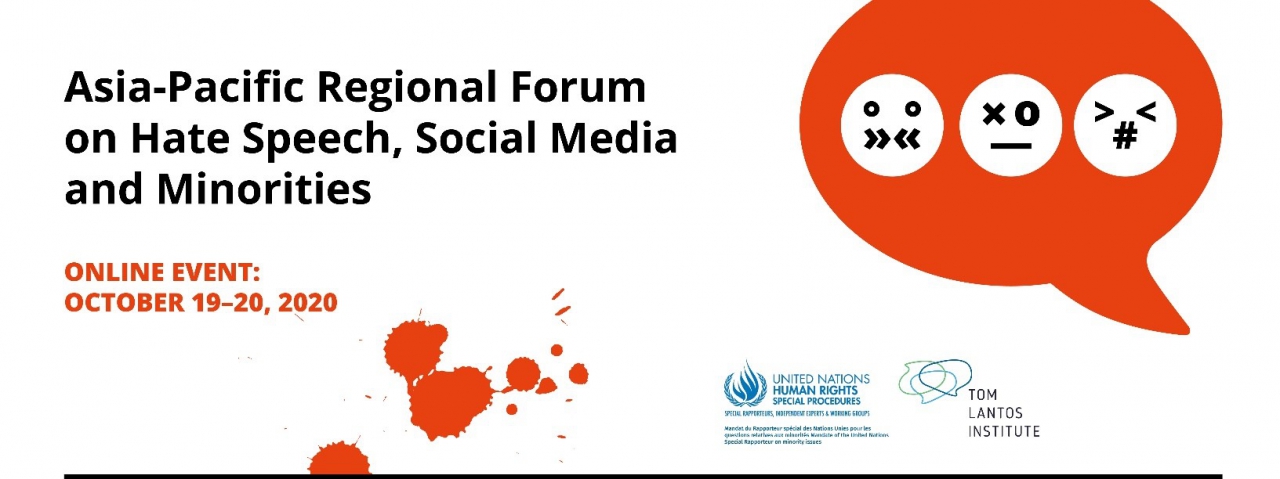
Asia-Pacific Regional Forum on Minority Issues 2020
Hate Speech, Social Media and Minorities Online Event

Background
Across the world today, discriminatory practices and hateful messages serve to stigmatize and vilify those perceived to be the “other”, the “foreigner” or the “one who does not belong”. Most of those targeted by these messages and hate crimes are minorities – overwhelmingly so. There was a reported 90 per cent increase in religious-based hate-crimes in India between 2014 and 2018. Most of these crimes have been directed towards members of the Muslim minority, who make up about 13 per cent of India’s population. Islamophobia and antisemitic incidents online are on the rise in many parts of the world, including in Australia where the 2017 Report on Anti-Semitism in Australia released by the Executive Council of Australian Jewry revealed a 10 per cent rise in anti-Semitic incidents reported nationally, and the 2018 report reported an unprecedented 60 per cent rise of incidents across the country. And as the Council of Foreign Affairs reported in 2019 in a backgrounder document, “A mounting number of attacks on immigrants and other minorities has raised new concerns about the connection between inflammatory speech online and violent acts, as well as the role of corporations and the state in policing speech.”(1) In Myanmar, military leaders and Buddhist nationalists used social media to demonize the Rohingya Muslim minority ahead of and during a campaign of ethnic cleansing. The UN fact-finding mission found that social media and hate speech had played a “determining role” in the campaign.(2) Analysts say trends in hate crimes around the world echo changes in the political climate, and that social media can magnify discord. At their most extreme, rumours and invective disseminated online have contributed to violence ranging from lynchings to ethnic cleansing.”
Expressions of hate and discrimination increasingly dominate political agendas and discourses, and are mainstreamed through public life, creating a climate of fear amongst individuals and communities. They can at times also create a climate of rejection, exclusion and even intolerance, threatening societal values and undermining the respect of human dignity and the protection of human rights. This type of speech, often called hate speech, in most cases target persons belonging to minorities, who are portrayed as a threat to national unity, societal harmony, national security and public order, or who are subjected to discrimination because of their distinct ethno-cultural identities, religions or languages.
Digital technologies and social media platform owners may play a role in contributing to hate speech and undermining human rights. Indeed, in recent times, there have been numerous and flagrant examples of the “rallying power” of social media platforms being abused to spread hatred, unfounded and stigmatizing rumours, fostering a climate of insecurity and animosity, and in the most extreme cases, leading to violent campaigns against members of minorities. Such unregulated online expressions of hate can result in or increase the chances of human rights violations taking place offline against some of the most vulnerable segments of society.
The full concept note for the 2020 Regional Forums is available here.
Objectives
The main purpose of the Asia-Pacific Regional Forum on “Hate Speech, Social Media and Minorities” is to provide regional insights, which will feed into the thematic work of the Special Rapporteur on minority issues for his report to the 46th session of the UN Human Rights Council in March 2021. Furthermore, discussions at the Regional Forum will also inform the work and recommendations of the 13th Session of the UN Forum on Minority Issues, which will take place in Geneva, on 19 and 20 November 2020.
The Asia-Pacific Regional Forum should have the following five more specific objectives:
- To raise awareness about and to promote understanding of the forms of online hate speech, including incitement to discrimination, hostility or violence, against persons belonging to minorities, and the role played by social media in its dissemination, and its harmful impact, including the ‘chilling effect’;
- Identify legal, institutional and policy challenges concerning the dissemination of online hate speech, particularly incitement to discrimination, hostility or violence, on social media against minorities;
- Explore and identify appropriate responses – especially those of states, social media
platforms and civil society – to the dissemination of hate speech against minorities on social media platforms, referring to good practices, in accordance with international human rights law and standards; - Strengthen the participation of persons belonging to minorities and their representatives in the development of laws and policies, as well as global discussions on online hate speech and the promotion of human rights and ethnic, religious, and linguistic diversity;
- Strengthen partnerships among various stakeholders and to build their capacity to address hate speech against minorities, especially incitement to discrimination, hostility or violence on social media platforms.
Date and Venue
Date: 19th – 20th October 2020
Virtual Meeting
Participation
The Asia-Pacific Regional Forum shall be open to the participation of states; intergovernmental organizations including United Nations agencies and mechanisms; national human rights institutions and other relevant national bodies; academics and experts on minority issues; representatives of minorities as well as civil society organizations specializing in minority issues.
Participation is open to individuals involved in minority issues in the Asia-Pacific region (see list of eligible countries here), and with a clear focus and expertise on hate speech, social media and minorities.
All individual participants must register online here. Registration will close at 11pm CEST, Friday 9th October.
When registering, participants are required to indicate during which working group or groups they would like to make a statement.
It is encouraged to submit any proposed recommendations in advance of the Asia-Pacific Regional Forum to
The Asia-Pacific Regional Forum will be a virtual event. Further details for joining the meeting will be sent following confirmation of registration.
Areas of Discussion
In light of the main objectives of the regional forums, the discussions will address the following overarching themes. These will be informed by the framework of international human rights law and standards:
- Causes, scale and impact of hate speech targeting minorities in social media
- International legal and institutional framework
- Regulation of online hate speech: The role and responsibility of intergovernmental organizations, States, internet companies and social media platforms
- Towards a safer space for minorities: positive initiatives to address online hate speech: The role of NHRIs, human rights organizations, civil society and other stakeholders
- A gender perspective will be applied to all areas of discussion to address the often ‘double’ marginalisation or targeting of minority women and girls in the context of hate speech in social media.
Outputs
Based on the discussions and the contributions of the participants, the main output produced from the Asia-Pacific Regional Forum will be a document with practical recommendations reflective of regional contexts and challenges.
Working Language: English

